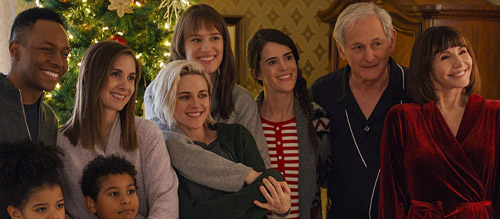Happiest Season (2020) Review
Happiest Season (2020)
Director: Clea DuVall
Screenwriter: Clea DuVall, Mary Holland
Starring: Kristen Stewart, Mackenzie Davis, Alison Brie, Aubrey Plaza, Dan Levy, Mary Holland, Victor Garber, Mary Steenburgen
Happiest Season may not be the first Christmas film to explore the lives of LGBT characters – think The Family Stone and Netflix’s Let It Snow – but it has been one of the first to be marketed towards a mainstream audience. Here, Kristen Stewart, with her Charlie’s Angels undercut, ‘San Junipero’ actor Mackenzie Davis and Ingrid Goes West star Aubrey Plaza are the perfect ingredients for the wholesome gay old time.
We meet Harper (Davis) and Abby (Stewart) on a candy cane walk. Harper loves Christmas and, because all couples must be odd couples, Abby is not as much of a fan. We learn very early on that this is of course due to a tragic but obvious backstory of both of her parents being dead. Nevertheless, Harper wants Abby to understand the joy of Christmas and so invites her to her family home for the holidays. All is well for this Christmas romantic comedy, the opening sequence being like the happily ever after to another film. There’s just one issue… Harper isn’t out.
This is where the film goes downhill.
In Happiest Season, the coming out narrative is used to excuse the behaviour of the lead character, and Harper’s behaviour can not be excused. Not only does she hide herself from her family (which is okay of course), but she lies to Abby about this and asks Abby to hide her true authentic self.
Harper spends the majority of the run time ignoring Abby and flirting with her ex boyfriend. It doesn’t help that there is zero chemistry between our two leads and that the main point of tension is Abby being treated poorly by everyone in Harper’s family – especially by Harper’s mother, played by Mary Steenburgen. Steenburgen often plays the loving, kind Christmas mother (think Elf and Step Brothers), but in Happiest Season she is the ultimate First Lady supporting her husband’s campaign for town Mayor, and has no time to entertain Harper’s ‘friend’, often making cruel orphan jibes and excluding her from the family. In addition, the children of Harper’s sister Sloane (Brie) get Abby arrested. At no point is it clear as to why Abby is even with Harper, and given the couple’s lack of backstory and on-screen chemistry, you find yourself wishing for Abby to leave her disrespectful partner, especially after being treated so poorly. This wish is only made greater by the presence of Aubrey Plaza as Harper’s high school girlfriend Riley, who forms a much more convincing bond with Abby; Plaza and Stewart displaying a real chemistry that is otherwise lacking from the film.
The central “hidden lover” narrative is not new to LGBT films, nor LGBT Christmas films, with almost precisely the same narrative being seen in Make the Yuletide Gay (2009), where a college student takes his boyfriend home for the holidays and they pretend to be roommates as the lead character isn’t out to his parents yet. The crucial difference between the two films is how Make the Yuletide Gay’s lead character Olaf (yes, that is his real name) is respectful of Nathan, whilst the same can’t always be said of Harper.
Happiest Season’s coming out narrative is therefore damaging in three key ways…
Firstly, it suggests that if you are an Abby you simply have to deal with how your partner treats you because they are in the closet.
Secondly, if you are a Harper, you will only be happy once you’re out.
Thirdly, and most damaging of all, Happiest Season places so much emphasis on the coming out to one’s parents, whereas in reality coming out is constant and continuous.
That’s not to say that Happiest Season isn’t without typical holiday movie charm. Perhaps the standout addition is Harper’s other sister Jane (Holland – who also co-wrote the screenplay). Jane is overlooked as the third sister, yet all she wants is for everyone around her to be happy. She is seemingly the only family member with a heart of gold, spending one hundred hours on her White Elephant (Secret Santa) present. Abby’s best friend and comic relief (Levy), is also a breath of fresh air – he might not be able to look after fish but he is seemingly the only person who cares about Abby. Sadly, this pair are not enough to save the film.
Despite some redeeming features, Happiest Season is not a modern Christmas classic. As a community we need less toxic representation, especially when dealing with the process of coming out, and ultimately Happiest Season is not the LGBT holiday film we were promised nor the one we deserve.
12/24



100% agree thank you